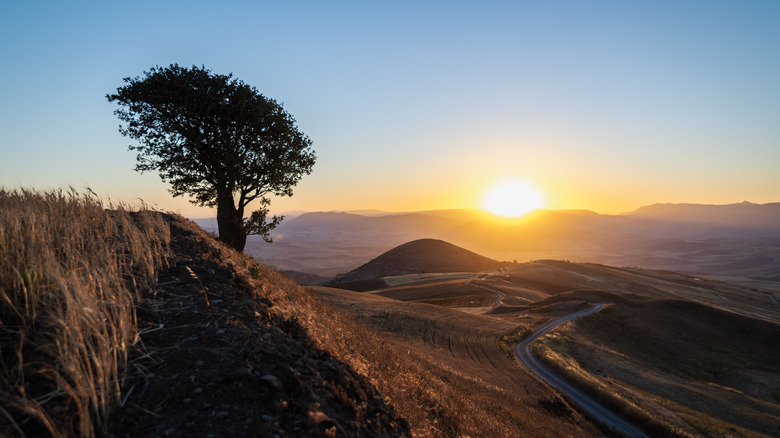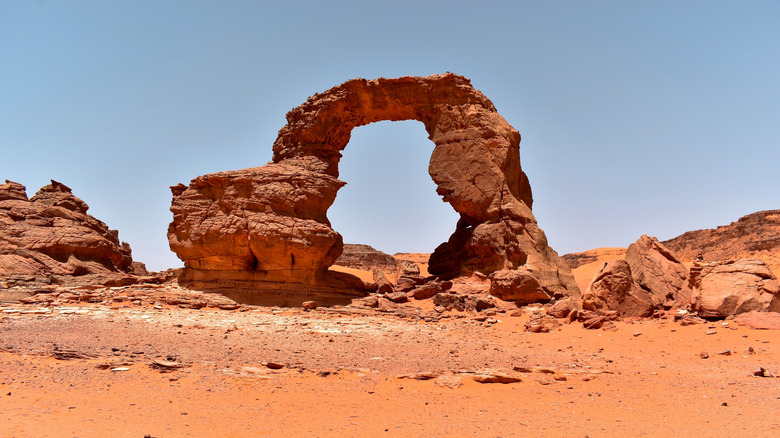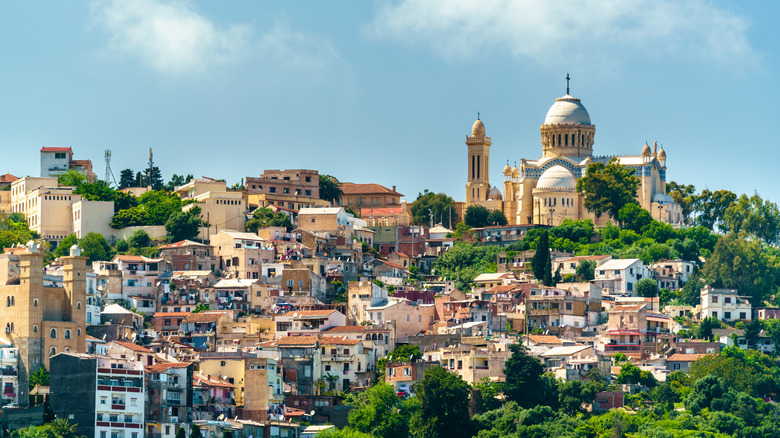Avoid Morocco's Tourist Crowds For The Untouched Scenic Dunes Of This Cheaper North African Gem
North Africa has long been a magnet for travelers, offering a rich tapestry of culture, history, and natural beauty. Morocco, with its bustling markets, ornate palaces, and diverse landscapes, often takes the spotlight. Agadir, a Moroccan coastal city with delicious food, has drawn countless tourists seeking sun and spice. But just east of Morocco, Algeria is a quieter alternative, offering a more affordable and uncrowded experience for adventurous travelers.
While Morocco's tourism sector accounts for over 7% of its GDP, Algeria's stands at just 1.2% as of 2022, according to UN Tourism data (via Our World in Data). This means fewer crowds, more authentic interactions, and unspoiled scenery for visitors. In 2023, Algeria simplified its visa process, issuing visas on arrival under specific conditions. To qualify, tourists need to book through Algerian tour operators, and they must arrive through and spend at least 70% of their trip in the southern region. This creates a unique opportunity to explore the expansive Sahara Desert, free from the dangers of Cairo in Egypt or the higher costs of Moroccan cities.
You can easily find 4-star hotels in Algiers (the country's capital) that cost around $60 to $100 per night, while most 4-star hotels in Marrakech, Morocco, are well over $100 a night. From the rolling dunes of the Sahara in the south to the Mediterranean coastline in the north, a stay in Algeria boasts a rich array of landscapes. Add in vibrant cities like Algiers and Oran, and this underexplored gem has something for everyone.
Tourism is a growing sector in Algeria
Tourism is not a cornerstone of Algeria's economy, which relies mainly on petroleum. As Aissam Slimani, an Algiers-based guide, told Middle East Eye, "Morocco, Egypt and Tunisia rely heavily on tourism for their local economies. In Algeria, we live off oil." This has its drawbacks — including fewer tourist-focused amenities — but also its perks: less crowding and a refreshing absence of overly commercialized attractions.
However, Algeria is laying the groundwork for a tourism boom. Saliha Nacerbay, Algeria's general director of the National Tourism Office, said the country aims to have 12 million visitors annually by 2030, as reported by The Independent. "To achieve this, we, as the tourism and traditional industry sector, are seeking to encourage investments, provide facilities to investors, build tourist and hotel facilities," Nacerbay said. The on-arrival visas are one step in this goal, and Air Algérie opened new direct flights from Paris and Marseille to southeastern Algeria. This region is home to the breathtaking Tassili n'Ajjer, a UNESCO World Heritage Site with ancient cave art dating back to 6000 B.C.
Reaching Algeria is straightforward, but navigating its visa requirements depends on your entry point. Most international flights land at Houari Boumediene Airport in Algiers, but visas on arrival are reserved for travelers entering through the south. To take advantage of this, book with an English-speaking Algerian tour operator like Essendilène Voyages or Tinariwen Tours. Flying through Europe or connecting via Algiers to a southern city is ideal. If you just want to visit the north, you can still apply for a tourist visa in advance at your closest Algerian consulate. Don't forget to leave space in your suitcase for local treasures like tea sets, spices, and other items you should buy there instead of packing.
What to see and do in Algeria
Algeria's southern Sahara Desert is full of sweeping dunes and ethereal sights, with treks by camel or foot. Golden sands stretch endlessly, interrupted only by oases and mysterious landmarks like Ksar Draa, an unexplained ancient ruin in the middle of the desert. From the city of Djanet, you can journey to Tikobawin, a sandstone maze with Neolithic tombs. It's best to visit the desert in the spring or fall to avoid soaring summer temperatures and below-freezing temperatures during winter nights.
The country's northern region is equally mesmerizing. Algeria's rich history, shaped by Mediterranean, Berber, and Islamic influences, is on full display. The Roman ruins of Djémila, a UNESCO Site, are among the best preserved in the world, offering a glimpse into ancient times. In Algiers, wander through the Kasbah, a labyrinth of Ottoman-era architecture, and marvel at Notre Dame d'Afrique, a striking basilica overlooking the sea.
Algeria's warmth isn't limited to its climate — it's evident in its people and cuisine. Visitors are welcomed with open arms, often invited to share tea or stories in vibrant souks, a type of North African market. The country's food is a celebration of flavor, including couscous, chorba, and desserts like traditional Algerian baklawa made with honey and almonds. Explore bustling markets for fresh produce and spices, and dine at authentic local spots for a taste of Algeria's culinary soul. Whether it's the landscapes, the history, or the hospitality, Algeria promises a one-of-a-kind adventure.


